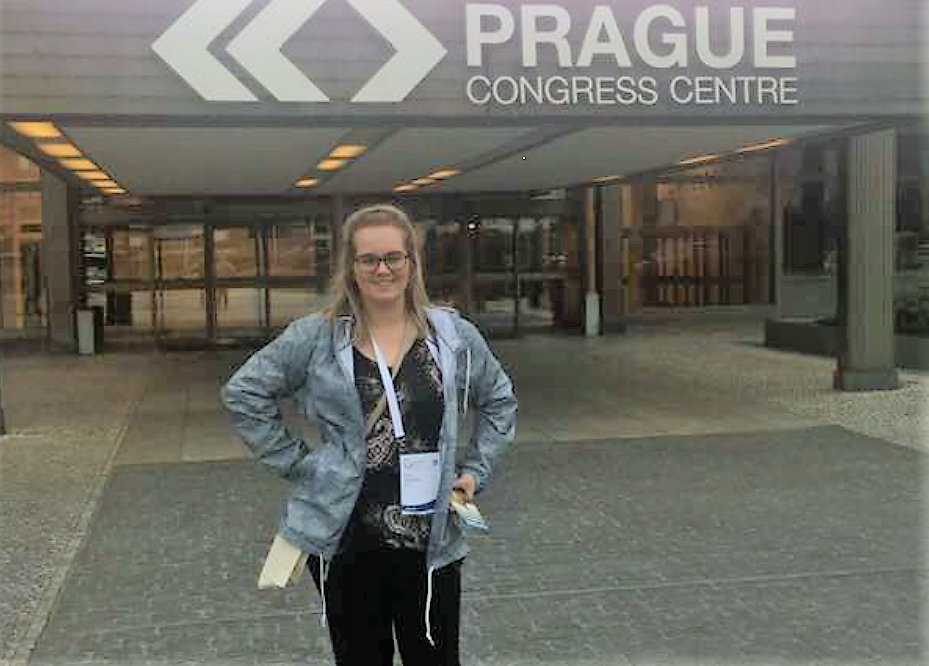
Rachel Sexton, a Wayne State University School of Medicine student pursuing her doctorate in Cancer Biology, has secured a two-year peer-reviewed grant from the United States Department of Defense to buoy her pursuit of identifying novel therapies for gastric cancer.
The Horizon Predoctoral Award from the DoD comes with $215,746 to support “Unveiling the Role of Nuclear Export Protein 1(XPO1)-microRNA Axis in Gastric Cancer.”
“I was very honored to receive it and am working hard every day to obtain data and successfully complete this project. Receiving this award was the boost that I needed to keep pushing through graduate school,” Sexton said.
The Horizon Award challenges junior scientists to develop and implement cancer research.
Sexton is in her fourth year of the Cancer Biology Graduate Program, housed within the School of Medicine and the Barbara Ann Karmanos Cancer Institute. She is mentored by Associate Professor of Oncology Asfar Azmi, Ph.D., who co-leads the Tumor Biology and Microenvironment Research Program and directs the school’s pancreatic cancer research.
Sexton joined the Azmi Lab because of her desire to work in a translational research lab. The research focus, gastric cancer, isn’t studied as much as breast or lung cancer, she added. She is planning a career in academia after earning her doctorate.
“I like the concept of taking a drug or compound from bench to bedside, and I want to make an impact in patient lives,” she said. “I have had an excellent experience as a doctoral student. I enjoy being at Wayne State and I like the atmosphere of the School of Medicine. Being a doctoral student is sometimes very stressful and very hard work, but I work hard balancing being a student with my regular life, and it helps that I have a great support system.”
Sexton started her academic career at WSU volunteering in the lab of Michael and Marian Ilitch Department of Surgery Professor David Gorski, M.D., Ph.D., while on summer breaks from her undergraduate studies at Michigan State University. Dr. Gorski is also medical director for the Alexander J. Walt Comprehensive Breast Center at Karmanos.
She had planned to pursue chemical engineering. “But because of this experience at Karmanos, I changed my major to the biological sciences because it was something I was very interested in,” she said. “I gained a lot of experience working in this lab and learning the basics of research. A lot of my laboratory training and skills that I still use today are due to the training from Cecilia Speyer, Ph.D., who patiently taught me how to execute experiments and use critical thinking skills to troubleshoot and guide the research in the Gorski Lab. After I graduated from MSU, I applied for the Cancer Biology Program and went straight into it.”
The foundation of her project is based on studying a small molecule inhibitor that targets a protein called XPO1.
“While working on my first publication detailing how targeting XPO1 has therapeutic benefit in gastric cancer, I wanted to move my project into a fresh direction and I suggested to Dr. Azmi that I should study small noncoding RNAs, such as microRNAs, because it’s a newer field and has a lot of potential for research applications.”
She will use the grant to study the differences in the expression of XPO1 in Black and Caucasian gastric cancer patients and whether any differences correlate to overall disease outcome.
“XPO1 overexpression causes unusual movement of cancer suppressing proteins to the incorrect location and makes them inactive. There is a drug that can block XPO1 and restore the good proteins in the correct compartment, thereby suppressing gastric cancer growth,” Dr. Azmi said. “She will also explore the impact of XPO1 inhibition in preventing gastric tumor growth in state-of-the-art tumor models representing this deadly disease. Her work proposes to shed light on new biomarkers of response to XPO1 targeted agents.”
Dr. Azmi’s lab has initiated several clinical studies using XPO1 inhibitors with clinical faculty at Karmanos Cancer Institute. The work is anticipated to lead to a tailored clinical study for gastric cancer treatment.
The grant number is CA191011.